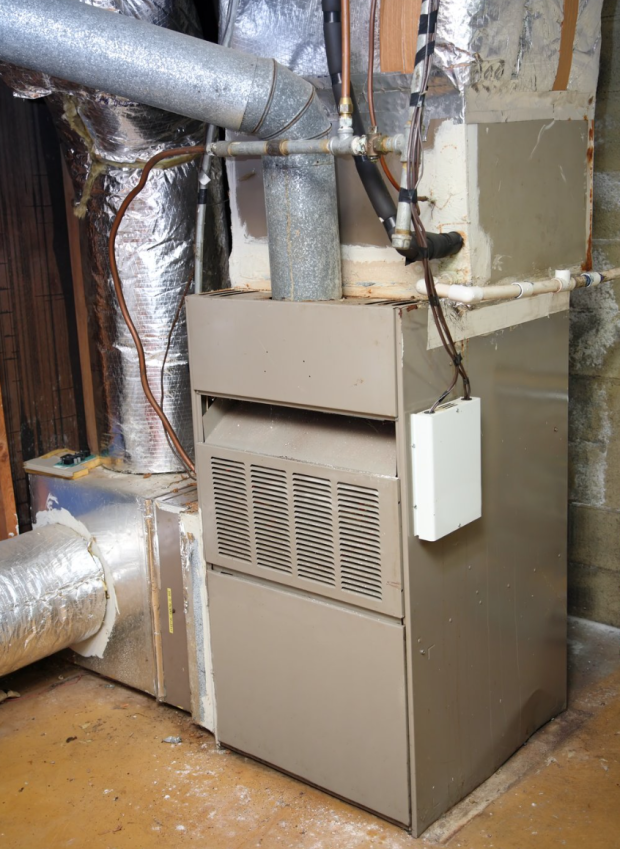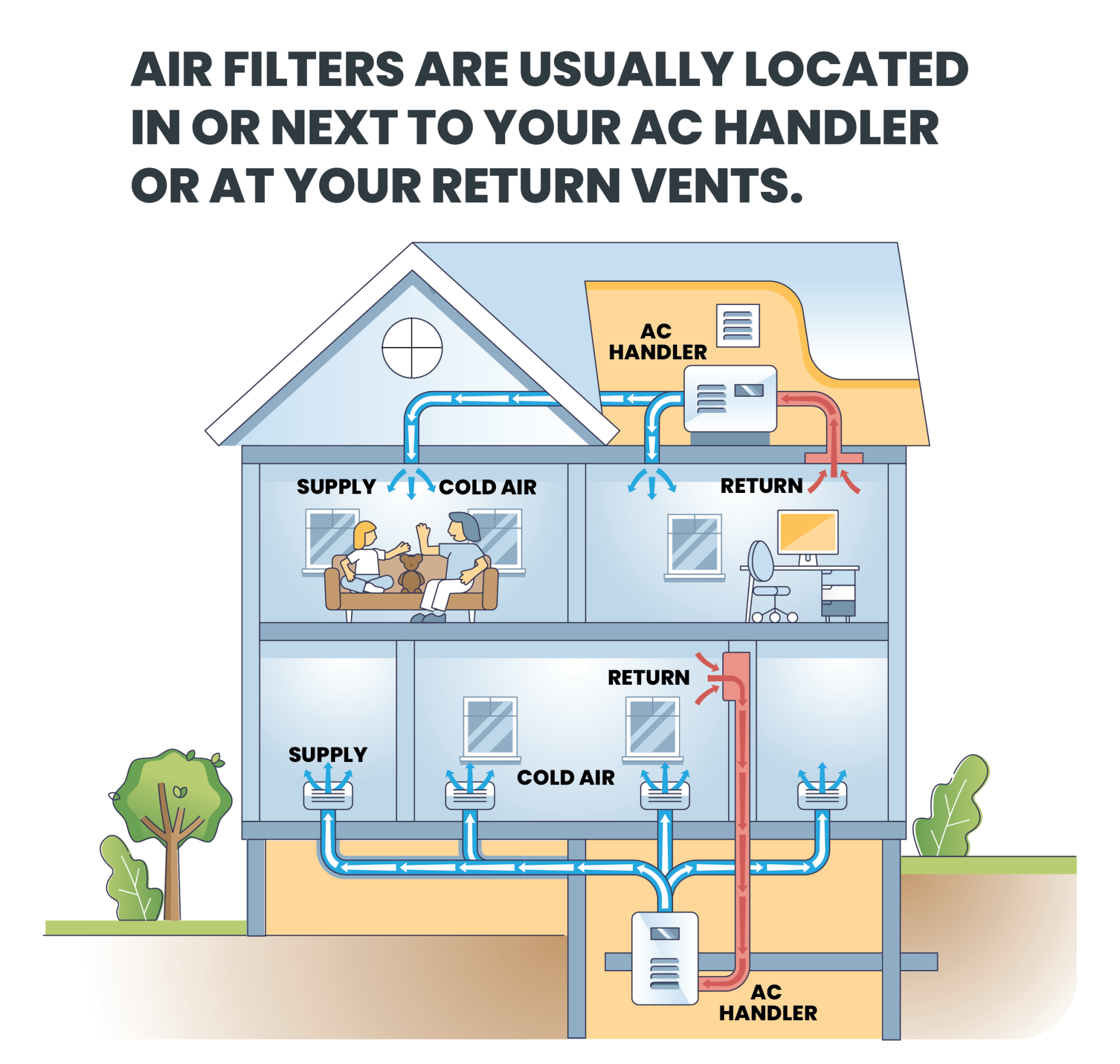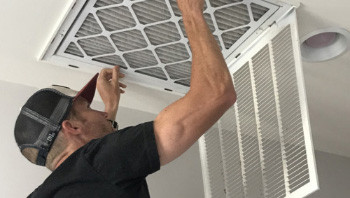- Wildfires and Indoor Air Quality: 5 Ways to Protect Your Home
- The Impact of the Palisades Wildfires & How FilterTime is Committed to Improving Air Quality and Helping Affected Communities
- How to Reduce Indoor Air Pollution During Home Renovations
- Seasonal Air Filter Guide: How to Choose the Best Filter for Each Season
- Top 10 Air Filter Maintenance Mistakes Homeowners Make

HVAC systems are an important part of daily life. They ensure comfort, but can also be a matter of safety, especially in extreme heat. Even in smaller or medium-sized homes, HVAC systems can be massive and complex. Most furnace filters are between one and five inches in thickness, so they can be difficult to find.
If you are a new homeowner, you may be wondering, "Where is the furnace filter located?" Each system is different, which makes answering this question even more challenging. The good news is that there are some basic steps you can take to find your furnace filter. This article explains how to do so. It also provides some information on why it is important to change it regularly.
How Often Should You Change a Furnace Filter?
How often you should change your furnace filters varies with the type you have, as well as a few other variables. In general, you should change your furnace filter about every 90 days. Most quality filters will have recommendations printed on them.
Another factor that can impact how often you change your filter is the air quality where you live. If there is a lot of dust or pollen, or if you have pets, then this will accumulate faster on the filter and clog it up. You may not want to wait the full 90-day duration to change your filter.
A final factor that can impact how often to change a furnace filter is if people in your family have allergies or respiratory sensitivities. If this is the case, then you may want to go with a filter with a higher MERV rating. We suggest MERV 11 or MERV 13. (Although, you should be careful not to get a filter that is too robust for your system, as it can create unnecessary wear and tear over time.)
These filters can catch smaller particles and keep your air cleaner. However, for the same reason, they can more quickly accumulate dust and debris and need changing more often.
Why It Is Important to Change the Filter Furnace
Better air quality in your home is a top main reason to change your air filters regularly. Depending on the caliber of the filter, they can capture dust, dirt, pollen, mold spores, fibers, hair, fur, and even some bacteria and microorganisms.
Furnace filters are made of spun fiberglass or pleated paper or cloth, encased in a cardboard frame. They are good at doing their job but, over time, the material can become dirty and clogged.
The other big reason to change your furnace filter is that it will help your system run better. A dirty filter means the unit has to work harder to push air throughout your home. This leads to higher electricity bills and greater wear and tear on your system over time. This means a shorter lifespan and a greater possibility of breakdowns.
Where Is the Furnace Filter Located?
Before we answer that question, we should note that a furnace filter is the same thing as an AC filter. Whether your home has a furnace or heat pump, the filter may be installed at the AC or air handler or return vents in the wall and ceiling.

Check Owners Manual
The first step is determining the type of system in your home. If you have the owner's manual, you can use it to pinpoint different components, including the air filter. You can find almost any owner's manual online, which could also be useful for maintenance or repairs in the future.
Check the Usual Spots
If you do have access to the owner's manual, do not worry. There are some basic locations where air handlers are placed, based on their functions.
The outdoor component of your HVAC system is the compressor. This is not the air handler. However, since this is the main part of the system that heats or cools the air in your home, it must be attached to the handler in some way. The air handler is sometimes located in the basement or crawl space. It is often near the opposite side of the wall where the compressor is located, but not always.
Another common location is the attic. In smaller homes, the air handler could be in an indoor closet.
Find the Filter Cover
Once you find the air handler, look for the slotted compartment where the filter goes. It is almost always on the front side of the handler (if you can determine that). If you are having trouble locating the slot, it is also often located near where the large intake air duct enters the handler. The compartment will be covered with a removable plastic or metal sleeve. It is usually marked, but older systems may not have this. Once you slide the cover away, you can access the filter.
Replace the Filter
When you remove the old filter, look for three things:

- First, see how gray and dirty it appears. If you know how long it has been in there, it will help you determine if you should be replacing it less or more often.
- Next, note which direction the filter was facing. If it was inserted correctly, this will help you recognize how to install the replacement filter. High-quality filters will have arrows indicating the airflow direction. Again, if the compartment is near the intake duct, then the arrows should point in the same direction as the air flowing into the unit.
- Lastly, since there are many different furnace air filter sizes, look on the filter for the printed size. If you recently bought the home, and the old filter doesn't appear to fit correctly, you might want to research the proper size for your unit.
Get More Furnace Filters and Other Tips
Now that you know where your furnace filters are located, you stay on top of regular maintenance. Keeping the filter changed keeps the air inside your home clean and allows your system to run as it should and last longer.
FilterTime is a web-based air subscription service. Our process is simple: select a high-quality filter and choose how often you need it delivered. Get started today, and do not hesitate to reach out to us with any questions.

« Back to News





